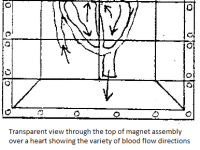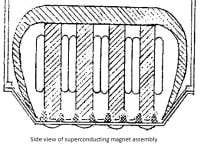In this invention, we will develop a type of linear induction motor in which powerful electromagnets will be able to drive the blood itself within the human body, thus providing a new means of life support without surgery or dependence on the beating of the heart. Much research must be done to build a practical, portable machine which has the capability to magnetically penetrate several inches of human flesh, induce currents within the saline fluids, and then drive the blood through the vessels without harming the blood, tissues, or organs. It may also be necessary to simultaneously drive fluids on other organs such as the lungs. The goal of this invention is to give medical science another tool which can be used to save lives due to heart attacks or during surgery when rapid and noninvasive methods are needed.
Because of the depth and strength of the magnetic fields necessary to reach the heart, the superconducting coils must be as few and as powerful as possible. The drawings show eight magnetic units which will be coordinated to provide pressure on the fluids and heart tissues to simulate the downward and upward flow as the heart beats. This may also be considered a form of heart massage, performed magnetically instead of surgically.
The device is connected to an external computer-controlled power supply, and connected through insulated piping to a liquid nitrogen supply to chill the superconducting materials necessary for generating such powerful fields. Sensing coils or electrodes may be added to the bottom plate to provide feedback signals to the control computer. A defibrillation system might also be added to the design. The unit could be supported over the patient by means of a counterweighted beam on a stand, or mounted on an extendable arm on the outside of an ambulance.
Although development and construction of such a machine is undoubtedly going to be costly, the potential of having readily available, for the first time, something that can be rapidly deployed in the first critical moments after a heart attack to keep the patient’s blood flowing, will make it well worth the effort.
Like this entry?
-
About the Entrant
- Name:Shannon Smith
- Type of entry:individual
- Patent status:none





